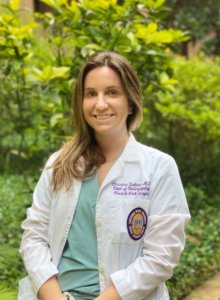Egg freezing allowed a young doctor to postpone childbearing without the worry of declining fertility

More women than ever are focusing on their careers and postponing a family until later in life. Egg freezing gives women some insurance that they can have a family without the worry of declining fertility that comes with advanced age.
“It’s unfortunate how few career-focused women know about egg freezing,” says Dr. Christine Settoon, a 5th year Ear, Nose and Throat resident at LSU Health Sciences Center in New Orleans. “Our society’s trend is that people are getting married later in life and focusing on careers before having babies, and I don’t see that changing anytime soon. Women should be more aware about their options of having children when they’re ready, which these days is later in their life.”
Dr. Settoon recently decided to freeze her own eggs after hearing about egg freezing from a friend. As an ENT resident in her early 30s with three more years of training to go, she knew she was nowhere near ready to start a family. Being single, working crazy hours with no time to date, Dr. Settoon was starting to feel anxious about being able to have children when she was ready. “Even if I was in a relationship and got married now, I wouldn’t have kids until I was 35 at the earliest,” she says.
As women age, their fertility declines
Women are born with a finite number of eggs and that number decreases every month with her cycle. A woman’s ovarian reserve, or egg supply, depends not only on the quantity but also the quality of the eggs in her ovaries. As a woman ages, her fertility naturally decreases as her ovarian quantity and quality goes down. This decline usually occurs slowly up until about 35 years of age, when fertility starts to fall even faster. While a woman in her 20s and early 30s has about a 20% chance of conceiving each cycle, by the age of 40 she has less than a 5% chance of conceiving.
After talking with her OB who thought it was a good idea and to her parents who were in complete support, Dr. Setton quickly made the decision to move forward with learning more about egg freezing. She made an appointment with Dr. Neil Chappell at Fertility Answers who suggested she start with an anti-Mullerian hormone, or AMH, test. This easy and inexpensive blood test quickly gives an approximate idea of a woman’s remaining egg supply and a starting point to decide her options for a future family.
“When Dr. Chappell told me my egg supply was in the 30th percentile for someone my age, I immediately became even more anxious about my future prospects. As a Type-A personality, I’ve never been in the 30th percentile in anything in my life,” joked Dr. Settoon. “Needless to say, I decided the next day to move forward with freezing my eggs.”
Egg freezing uses many of the same steps as an IVF cycle
Egg freezing utilizes advanced cryopreservation techniques to freeze and store a woman’s eggs for future use. The process involves many of the same steps in a typical IVF cycle and starts with stimulating the ovaries with medication to cause several egg follicles to mature. Once your ovarian follicles mature, you will come to our Louisiana fertility center for egg retrieval. During the procedure, you will be sedated, while your physician trans-vaginally removes mature eggs using ultrasound guidance.
After the egg retrieval procedure, our laboratory will culture and freeze your eggs. Your eggs can remain frozen for years until you decide that you’re ready to get pregnant. Then, our laboratory will thaw your eggs and combine them with your partner’s sperm or donor sperm to allow for fertilization. Then, the resulting embryo will be transferred to your uterus.
Since the process of egg freezing takes several weeks, Dr. Settoon found fitting the process into her busy hospital work schedule was the tricky part. “I can’t thank my co-workers enough who supported me during this process,” says Dr. Settoon. Her fellow ENT residents helped cover for her during the entire process that required travel to Fertility Answers for blood tests and ultrasounds to monitor her response.
Freezing her eggs helped Dr. Settoon feel empowered and confident of her choice to be a doctor
Dr. Settoon was relieved when she learned her egg retrieval produced 14 viable eggs for her to freeze. “I felt like a huge weight was lifted off my shoulders after learning that,” she says. While freezing her eggs helped with the anxiety she was feeling about what her future held, it was also incredibly empowering. “I chose this career that I knew would take everything out of me for several years while I trained. But freezing my eggs allowed me to feel good about my career choice from a personal standpoint. Egg freezing has given me some assurance that children can still be attainable no matter how long I need to wait.”
Doctors spend their 20s and 30s training in medical school, residency and fellowship, a process that can take over a decade depending on the specialty. “It’s a shame that while we are giving up our prime reproductive years to our medical training, these same programs don’t supply us with information and options to preserve our fertility,” says Dr. Settoon. She worries about the many women who don’t know the option even exists.
“I am amazed how many professional, career-focused women my age don’t know about egg freezing,” says Dr. Settoon. She admits that even being in the medical world she had not heard about it until she was well into residency. “But, I am willing to personally share my story with as many who will listen in the hopes that it will bring about change in the future and more choices for women.”


